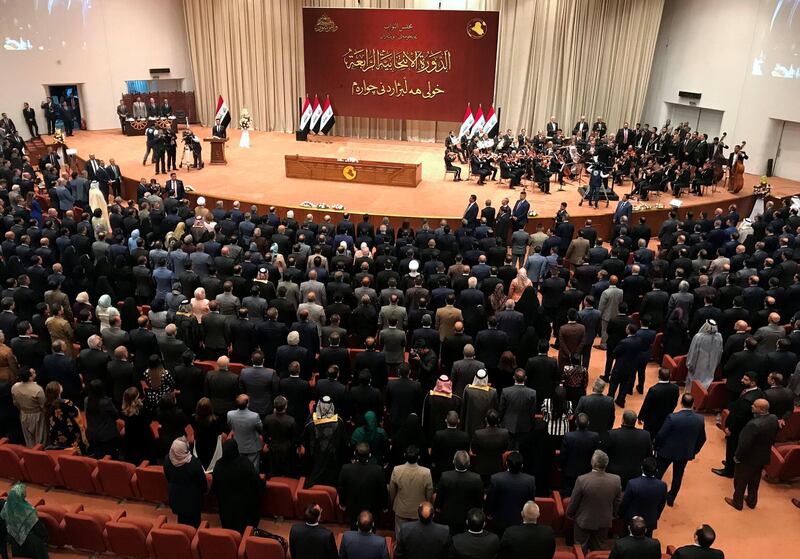Iraq's parliament approved three new ministers on Tuesday to end weeks of political deadlock but the session ended before a vote on five more positions, leaving key ministries vacant.
The five remaining posts include interior and defence, seen as the most vital positions to confirm before a full cabinet can be formed.
The brief session brings to 17 the number of filled posts in Prime Minister Adel Abdel Mahdi's 22-ministry cabinet. The other 14 were approved by parliament in late October.
New Higher Education Minister Qusay Al Suheil, 53, is a member of former premier Nuri Al Maliki's State of Law bloc.
Planning Minister Nuri Al Dulaimi, 51, is an Iraqi Islamic Party member while Minister of Culture Abdulamir Al Hamdani, a 51-year-old archaeologist, is backed by pro-Iran force Asaib Ahl Al Haq.
The confirmations come two days after Mr Abdel Mahdi's controversial nominee to head the Interior Ministry returned to his former posts as the chairman of the Popular Mobilisation militias and national security adviser to the prime minister.
Falih Al Fayadh retook his seat at a National Security Council meeting on Sunday after he was sacked from his positions by caretaker prime minister Haidar Al Abadi in August for political behaviour.
___________________
Read more:
UAE rebuilding of Mosul mosque 'defeats extremism'
UAE launches greatest cultural restoration project in Iraq to revive Al Nuri mosque
UAE funds rebuilding of Mosul’s Al Nuri Mosque and historic minaret
___________________
Mr Al Fayadh has been at the centre of the deadlock surrounding Mr Abdel Mahdi's appointees. His nomination to run the Interior Ministry has the backing of the largest Iranian-aligned bloc in Parliament, which includes representatives of the Popular Mobilisation Forces.
The PMF were formed in 2014 to stop the advance of ISIS militants through Iraq. They include several militias funded and trained by Iran.
The political bloc of populist cleric Moqtada Al Sadr is opposing Mr Al Fayadh's appointment at the Interior Ministry, saying it wants to limit outside influence in politics. Mr Sadr's bloc, Saeroon, won the largest share of seats in parliamentary elections last May.
The Interior Ministry has been under the control of ministers close to Iran since 2010.
Mr Abdel Mahdi was sworn in to his post in October but has governed without a full cabinet after parliament approved just 14 of 22 ministerial appointments. On Tuesday, parliament approved new ministers of culture, planning and higher education, leaving five posts unfilled.
Parliament is slated to meet again on Thursday to discuss the remaining cabinet vacancies.





